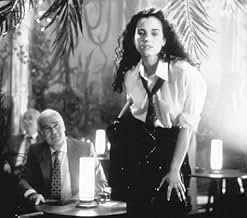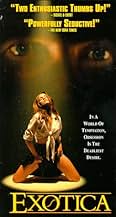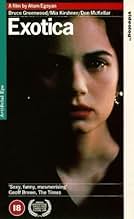CALIFICACIÓN DE IMDb
7.0/10
22 k
TU CALIFICACIÓN
Un hombre atormentado por neurosis frecuenta el club Exotica en un intento de encontrar consuelo, pero incluso allí su pasado le persigue.Un hombre atormentado por neurosis frecuenta el club Exotica en un intento de encontrar consuelo, pero incluso allí su pasado le persigue.Un hombre atormentado por neurosis frecuenta el club Exotica en un intento de encontrar consuelo, pero incluso allí su pasado le persigue.
- Dirección
- Guionista
- Elenco
- Premios
- 16 premios ganados y 12 nominaciones en total
Maury Chaykin
- Exotica Club Client
- (sin créditos)
C.J. Lusby
- Exotica Club Dancer
- (sin créditos)
Nadine Ramkisson
- Exotica Club Dancer
- (sin créditos)
- Dirección
- Guionista
- Todo el elenco y el equipo
- Producción, taquilla y más en IMDbPro
Opiniones destacadas
Interesting opening credits. Interesting cast. Interesting use of Leonard Cohen's song. But in totality, just above average. The film deals with a set of characters, each having some sort of a psychological problem. Visually strong, but content-wise very weak.
This is my first Egoyan film. He has evidently some talent to make a viewer sit up and expect the unusual. But why populate an entire film with problem characters? That's not reality.
The most interesting bit was actor Don McKellar who plays Thomas is made to look like the director Atom Egoyan, complete with his glasses. Is that an autobiographical touch?
This is my first Egoyan film. He has evidently some talent to make a viewer sit up and expect the unusual. But why populate an entire film with problem characters? That's not reality.
The most interesting bit was actor Don McKellar who plays Thomas is made to look like the director Atom Egoyan, complete with his glasses. Is that an autobiographical touch?
I can't remember seeing a film as intriguing, complex, and beautifully photographed as "Exotica." I nearly didn't watch it because the video cover advertized it as an "erotic thriller" and the image on the front is of Mia Kirchner doing her strip-tease bit. Granted, "Exotica" centers around a "gentleman's club" of the same name, but to call this film a simple erotic thriller is to miss out on a lot, on too much.
"Exotica" follows four seemingly unrelated storylines: a man sitting alone at a table in a strip club, another man smuggling exotic parrot eggs into the country ("Exotica" takes place in and around Toronto), two apparent strangers walking in a field of green, and a young girl who plays a flute in an empty house. Egoyan begins with these vastly different puzzle pieces then slowly, inexorably brings them together.
Atom Egoyan is one heck of a masterful director. He is the epicenter of this cinematic symphony that leads carefully from movement to movement until the finale bursts forth in equal measure of catharsis, discovery, and tragedy. Plot to him is like tapestry weaving. He threads narrative, characters, time, and setting in such complicated iterations that one is at once nearly overwhelmed by the intricacy and awed at his skill, a testament to his brilliance as well as his belief that a film-going audience is actually intelligent.
At it's heart, "Exotica" is a tragedy of circumstances. Or better yet, a collision of tragedies of circumstances. Indeed, the film isn't so much about tragedy as it is about those who survive tragedy and the toll a single event can exact for the rest of the lives of those who survive. Exotica, the gentleman's club, serves merely as a focal point where all these individual tragedies radiate to.
Equally haunting in all this is the music. Mychael Danna's score sets the film's tone: dark, "exotic," deceptively simple but savvier than it lets on. Also worthy of note is the music in the club itself, a blend of American house funk and Middle Eastern tones, warbled in Arabic.
I highly recommend this film. Ignore the naked women who sashay from time to time in front of the screen (difficult as that may be at times) in the scenes shot in the club. The really interesting stuff occurs at the margins of the film, as the gulf separating the storylines begin to vanish, and the final scene gives you the keystone to a horrifying clear vision of a sadness so overwhelming that no one in the film escapes unscathed.
"Exotica" follows four seemingly unrelated storylines: a man sitting alone at a table in a strip club, another man smuggling exotic parrot eggs into the country ("Exotica" takes place in and around Toronto), two apparent strangers walking in a field of green, and a young girl who plays a flute in an empty house. Egoyan begins with these vastly different puzzle pieces then slowly, inexorably brings them together.
Atom Egoyan is one heck of a masterful director. He is the epicenter of this cinematic symphony that leads carefully from movement to movement until the finale bursts forth in equal measure of catharsis, discovery, and tragedy. Plot to him is like tapestry weaving. He threads narrative, characters, time, and setting in such complicated iterations that one is at once nearly overwhelmed by the intricacy and awed at his skill, a testament to his brilliance as well as his belief that a film-going audience is actually intelligent.
At it's heart, "Exotica" is a tragedy of circumstances. Or better yet, a collision of tragedies of circumstances. Indeed, the film isn't so much about tragedy as it is about those who survive tragedy and the toll a single event can exact for the rest of the lives of those who survive. Exotica, the gentleman's club, serves merely as a focal point where all these individual tragedies radiate to.
Equally haunting in all this is the music. Mychael Danna's score sets the film's tone: dark, "exotic," deceptively simple but savvier than it lets on. Also worthy of note is the music in the club itself, a blend of American house funk and Middle Eastern tones, warbled in Arabic.
I highly recommend this film. Ignore the naked women who sashay from time to time in front of the screen (difficult as that may be at times) in the scenes shot in the club. The really interesting stuff occurs at the margins of the film, as the gulf separating the storylines begin to vanish, and the final scene gives you the keystone to a horrifying clear vision of a sadness so overwhelming that no one in the film escapes unscathed.
Don't be fooled by the soft-porn title or the "sexy thriller" style art on the VHS box and DVD cover. This, like Egoyan's follow-up masterpiece "The Sweet Hereafter" is an intricate, elliptical, and tragic look at grief and loss focusing on the people who work at and patronize a Toronto strip club. It's all very literary and symbolic (the exotic creatures of the pet shop being audited by Bruce Greenwood's tax man with a sad secret mirroring the exotic dancers of the club where he finds his solace after hours) and surprisingly emotional (especially at the end). Character development, secrets, and inner truths are revealed slowly and carefully and in non-linear fashion by Egoyan's delicate director's hand. The "exotic" flavored yet haunting musical score is an added bonus. Worth a look if you are in the right mood and know what to expect from Egoyan.
Like other Egoyan films, this one starts like an incomplete jigsaw puzzle, with the missing pieces added as it progresses. However, it is not the plot that is the most important part of the film but the intriguing interactions between the characters. There's the auditor trying to overcome a painful past while reviewing the books of the gay pet shop owner. Then there's the lesbian strip club owner, the jailbird stripper, and the DJ who completes the volatile love triangle. There is fine acting by the entire cast, with Greenwood and Koteas specially good. The music by Danna perfectly underscores the sense of mystery. Egoyan masterfully balances the plot lines until the pieces come together to form a nearly complete picture - there are still unanswered questions for the viewer to ponder!
'Exotica' is clearly Egoyan's best film and his most successful presentation of the motifs that have characterized his films throughout his career; these include the presentation of the narrative out of chronological order, the interaction of characters by means of videotape and hidden surveillance, the relationship between parent and child, and the repetition of situation and dialogue. The film's theme involves the superficial barriers-both physical and psychological-that prevent people from making a genuine emotional connection with others; as we watch the film we witness how various people react to these barriers and struggle to break them down. The film's strong emphasis on structure and focus on Thomas' and Francis' parallel 'hunts' for human contact can't help but remind of that masterpiece of medieval literature 'Sir Gawain and the Green Knight' (this is a work that Egoyan was born to adapt to the screen). In my opinion each of the film's six major characters parallels another to compile three pairs. The first pair of characters is composed of Thomas and Zoe. The most obvious similarity between these two is that each owns one of the film's two principle locations. Thomas' pet store and Zoë's strip-club are comparable in that both are businesses whose principle merchandise is living creatures that are excessively displayed so as to persuade the customer to make a purchase. Moreover, while the pet store is lined with glass cages and fish-tanks, the walls of the strip-club are composed of two-way mirrors through which employees can secretly observe the customers. In addition to the life that each openly sells, both also possess hidden life. We see this in Zoë by the fact that she is very pregnant, but must disguise her appearance so as not to remind customers of the possible consequences of the lecherous behavior that her club encourages. Likewise, in the film's first scenes we see that Thomas is pregnant in a different way. Here, he is smuggling exotic bird eggs into the country by strapping the eggs to his stomach in order to hide them from Canadian customs officials. This hidden life also extends to their introverted personalities. To combat their inability to communicate verbally, both try to make interpersonal connections by means of physical contact. In a sense, then, Thomas and Zoë (as the Greek origin of her name might suggest) are givers of life both openly in their businesses and privately in their interaction with others. Next, Francis and Eric are parallel characters because of their mutual obsessions with Christina. Although Christina is intended to be seen as a sex object, neither Francis nor Eric has any interest in her in this regard. Instead, she symbolizes an emotional relationship that both once had, but now have lost. When they eventually discover their real relationship, Francis and Eric find that they do not need Christina and make an emotional bond with each other, which is symbolized by a physical embrace. Lastly, Christina and Tracey can be associated because Francis considers both as symbols of his dead daughter. However, Francis' relationships with Christina and Tracey both fail because he is unable to develop bonds that go beyond their assigned roles as a stripper and babysitter. Therefore, while Zoë and Thomas can be seen as givers of life, Christina and Tracey clearly receive life by taking on the roles that Francis and Eric impose on them. There are also many reoccuring images and symbols that reinforce the emotional isolation of the characters. The use of secret surveillance by two-way mirrors serves both as an invisible yet uncrossable boundary between people who would otherwise be very close to one another and as a way for the characters to make private judgments of those who are being unwittingly observed. In fact, while Eric secretly observes and judges Francis during his nights at Exotica, Francis, because of this job as an auditor, does the same to Thomas during the day. Egoyan reminds us that this relationship can ultimately be extended to include the audience members, who also make private judgments of the film's characters (we've this before in films like Hitchcock's 'Rear Window' and Powell's 'Peeping Tom'). As we watch the film, we too are in a sense reaching out to forge an emotional connection that transcends the barrier of the medium itself. The film's overriding presence of money suggests to the characters that the only legitimate grounds for a relationship is financial, and any time an emotional connection is made the characters feel guilty if they are not paying for it. Finally, the frequent appearance of parrots and their uncharacteristic silence reflects the characters' inability to communicate and overcome the losses of their past. I've really grown to admire this film and Egoyan's work in general. In 'Exotica' he creates a work of complex symmetry and interconnecting symbols while also conveying an atmosphere of lyrical intensity.
¿Sabías que…?
- TriviaAtom Egoyan says that the film was inspired by three experiences: being taken to a lesbian club where women onstage performed as men; having a tax auditor suggest to him (incorrectly) that he was being cheated by a business partner; and realizing as a teenager that a friend was trapped in an incestuous relationship.
- ErroresIn one scene when Eric is talking with Cristina walking on the grass, you can see a microphone at the top of the screen.
- Bandas sonorasEverybody Knows
Performed by Leonard Cohen
Written by Leonard Cohen and Sharon Robinson
Published by Leonard Cohen Stranger Music, Inc. (BMI) and Geffen Music
Courtesy of Sony Music Entertainment (Canada) Inc.
Selecciones populares
Inicia sesión para calificar y agrega a la lista de videos para obtener recomendaciones personalizadas
- How long is Exotica?Con tecnología de Alexa
Detalles
Taquilla
- Presupuesto
- CAD 2,000,000 (estimado)
- Total en EE. UU. y Canadá
- USD 4,221,036
- Fin de semana de estreno en EE. UU. y Canadá
- USD 100,654
- 5 mar 1995
- Total a nivel mundial
- USD 4,221,036
Contribuir a esta página
Sugiere una edición o agrega el contenido que falta




































